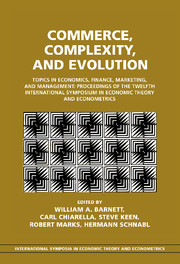 Commerce, Complexity, and Evolution
Commerce, Complexity, and Evolution Book contents
- Frontmatter
- Contents
- Series editor's preface
- Volume editors' preface
- Editors
- List of contributors
- I Philosophical and methodological implications of complexity and evolution in economic systems
- 1 Toward a generalized Coase theorem: a theory of the emergence of social and institutional structures under imperfect information
- 2 Universal Darwinism and social research: the case of economics
- 3 Uncertainty, risk, and chaos
- 4 The role of innovation in economics
- II Finance and the macroeconomy
- III Market and sectoral dynamics
- IV Marketing and interdependent behavior
3 - Uncertainty, risk, and chaos
Published online by Cambridge University Press: 05 December 2011
- Frontmatter
- Contents
- Series editor's preface
- Volume editors' preface
- Editors
- List of contributors
- I Philosophical and methodological implications of complexity and evolution in economic systems
- 1 Toward a generalized Coase theorem: a theory of the emergence of social and institutional structures under imperfect information
- 2 Universal Darwinism and social research: the case of economics
- 3 Uncertainty, risk, and chaos
- 4 The role of innovation in economics
- II Finance and the macroeconomy
- III Market and sectoral dynamics
- IV Marketing and interdependent behavior
Summary
I clarify the distinction between economic uncertainty and risk and consider the implications that both risk and uncertainty have for decision making and behavior. To this end, I review recent assessments of Keynes' views about the influence of probability over human conduct. Bill Gerrard, for example, has argued that the traditional “Keynes-as-philosopher” research has largely neglected probability theory. However, he goes on to criticize those Keynesian fundamentalists who assert that Keynes rejected the “probability calculus” out of hand as means of understanding economic behavior under uncertainty. Gerrard complains that this fundamentalist viewpoint offers a negative critique only and does not put forward a constructive alternative in its place. He demonstrates that new Keynesian scholarship has remedied this defect and proceeds to show how Keynes' early philosophical writings can be gainfully used to illuminate key arguments in later economic works like the General Theory.
I provide an outline of Gerrard's own framework to clarify the important difference among risk, uncertainty associated with chaotic systems, and the fundamental uncertainty associated with liquidity preference and the irreversibility of investment decisions. I suggest that this conceptual divergence must also, of necessity, be reflected in significant differences in analysis, econometric methodology, and also policy prescription.
In a related vein, Bayesian theorists have questioned the relevance of Frank Knight's original distinction between risk and uncertainty by interpreting the latter as a form of subjective risk. These pernicious attempts to tame the untamable have been competently criticized by Joachem Runde, who has demonstrated that liquidity preference is incompatible with Savage's canonical version of the Bayesian model.
- Type
- Chapter
- Information
- Commerce, Complexity, and EvolutionTopics in Economics, Finance, Marketing, and Management: Proceedings of the Twelfth International Symposium in Economic Theory and Econometrics, pp. 37 - 60Publisher: Cambridge University PressPrint publication year: 2000


